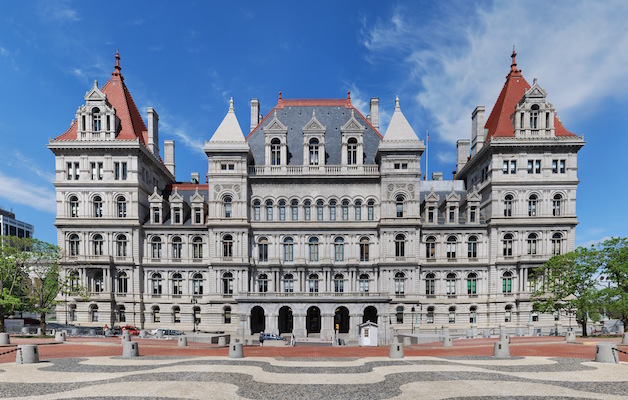
BY PAUL SCHINDLER | This week’s conviction of former State Assembly Speaker Sheldon Silver on seven counts of public corruption — in steering public funds to a university research center on asbestos-related lung disease and in guaranteeing real estate interests tax breaks, all in return for roughly $4 million in personal enrichment — should be a sobering moment for anyone who cares about clean government in New York State.
Earlier this year, the New York Public Interest Group Fund (NYPIRG) labeled the state’s recent era of corruption indictments and convictions New York’s “Watergate moment.” The New York City Bar Association and Common Cause New York noted that since 2010, 13 members of the State Assembly and Senate have been convicted on corruption or related charges — that before Silver’s downfall and not accounting for what might happen in the current trial of former State Senate Majority Leader Dean Skelos.
Some would argue that Silver’s conviction proves that the system is working, but let’s bear in mind how close a call any conviction is and also recall how audacious the disgraced former speaker’s schemes were. Silver’s attorneys harped on the lack of explicit quid pro quos between him and those with whom he exchanged favors, and tried to characterize the transactions under investigation as accommodations common in government, especially among parties on friendly terms… as though we would ever strive to create a government that functioned that way.
Silver was successful for a time in pursuing his schemes due to several serious shortcomings in the system — including his ability to appropriate $500,000 to the asbestos health research center without line-item accountability as well as the lack of meaningful reporting requirements on the substantial outside earnings he enjoyed even as he was paid to serve the public.
Silver was convicted because a determined federal prosecutor, Preet Bharara, was incensed at the half-assed efforts by Governor Andrew Cuomo to probe public corruption in Albany and the milquetoast reforms the Legislature enacted as the governor was making a show of cleaning up the state capital.
Now, a broad range of reform groups — including NYPIRG, Common Cause, Citizens Union, the League of Women Voters of New York State, and Reinvent Albany — are demanding that Cuomo and the Legislature do the heavy lifting of real reform. The time is long overdue.
The reforms the groups are pressing for fall into four major areas — legislators’ compensation and financial disclosure, campaign finance reform, strengthening independent oversight, and standardizing and streamlining lobbying disclosure. All of these areas are important.
One key goal is imposing limits on outside income, the same way it’s done for members of Congress. Being a state legislator is a full-time job, and each has a staff that works full time. But as the longtime leader of one of the two chambers of the Legislature, Silver was able to earn handsome outside income with very little in the way of reporting constraints. Some suggestions would limit outside income to $20,000 or less, while Upper West Side Assemblymember Daniel O’Donnell is calling for a ban on any outside income, coupled with a raise from the current base pay of $79,500.
The details of how to approach this can be debated, but for anyone who doubts the practicality of asking legislators to limit their incomes in this way, it’s worth noting that fully two-thirds of state senators and 73 percent of Assembly members reported no outside income or income amounting to less than $20,000, according to NYPIRG, Common Cause, and Reinvent Albany. Outside income is a problem limited to a relatively small number of legislators but the potential for mayhem is significant.
Related to limiting outside income is the goal of curbing what are known as “lulus,” additional pay awarded to certain legislators for committee and other leadership posts which ensures their loyalty to the Assembly speaker and the Senate majority leader.
And what outside income legislators are allowed to earn ought still be held to strict reporting requirements.
On the campaign finance side, one clear goal of reformers is the closing of what is called the LLC loophole, which evades the requirement that campaign contributors disclose their employers and allows campaigns to be funded by “dark money.” More ambitiously, advocates call for a public financing system similar to the one that has worked very well in New York City.
Reformers also focus considerable attention on strengthening the structure, span of authority, independence, and transparency of the New York State Joint Commission on Public Ethics, the body charged with overseeing questions of honesty in government. If a body like this is expected to reverse the troubled state of public integrity here, it needs professional resources and freedom from political influence, but it also must be willing to come clean with the public, because it’s there that confidence in government must be restored.
New York is a state rich in talent, compassion, creativity, and innovation, yet it is also one whose government recently was graded D– by the Washington-based Center for Public Integrity. The situation will only change if we the voters demand it.
WRITE US: Address letters to the editor, story ideas or tips, and proposals for writing an Express Yourselves op-ed to:
Editor@ManhattanExpressNews.nyc
Please limit letters to the editor to 250 words or less. The editor reserves the right to edit letters for space or legal considerations.




































